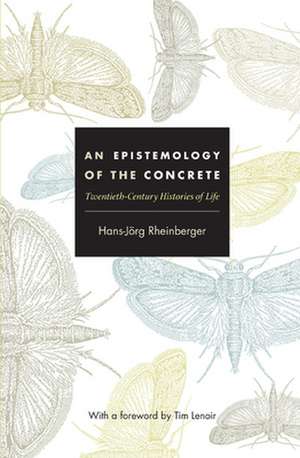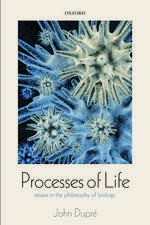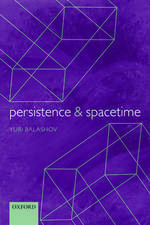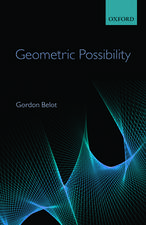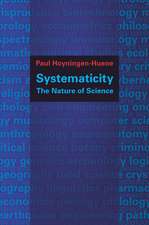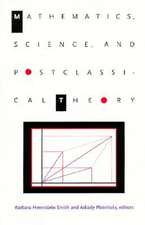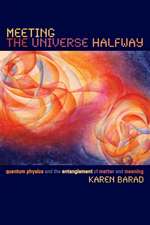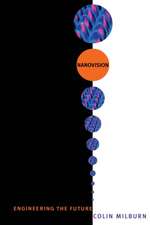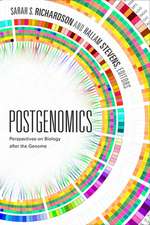An Epistemology of the Concrete – Twentieth–Century Histories of Life
Autor Hans–jörg Rheinbergeren Limba Engleză Paperback – 5 sep 2010
Preț: 299.47 lei
Nou
Puncte Express: 449
Preț estimativ în valută:
57.31€ • 59.61$ • 47.31£
57.31€ • 59.61$ • 47.31£
Carte tipărită la comandă
Livrare economică 15-29 aprilie
Preluare comenzi: 021 569.72.76
Specificații
ISBN-13: 9780822345756
ISBN-10: 0822345757
Pagini: 352
Ilustrații: 43 illustrations
Dimensiuni: 159 x 229 x 19 mm
Greutate: 0.46 kg
Editura: MD – Duke University Press
ISBN-10: 0822345757
Pagini: 352
Ilustrații: 43 illustrations
Dimensiuni: 159 x 229 x 19 mm
Greutate: 0.46 kg
Editura: MD – Duke University Press
Cuprins
Illustrations; Foreword by Tim Lenoir; ProloguePart I Historical Epistemology1 Ludwik Fleck, Edmund Husserl: On the Historicity of Scientific Knowledge; 2 Gaston Bachelard: The Concept of Phenomenotechnique; 3 Georges Canguilhem: Epistemological HistoryPart II Model Organisms: Studies in the History of Heredity and Reproduction4 Pisum: Carl Correnss Experiments on Xenia, 189699; 5 Eudorina: Max Hartmanns Experiments on Biological Regulation in Protozoa, 1914 21; 6 Ephestia: Alfred Kühns Experimental Design for a Developmental Physiological Genetics, 192445; 7 Tobacco Mosaic Virus: Virus Research at the Kaiser Wilhelm Institutes for Biochemistry and Biology, 193745Part III Concepts and Instruments: Studies in the History of Molecular Biology8 The Concept of the Gene: Molecular Biological Perspectives; 9 The Liquid Scintillation Counter: Traces of Radioactivity; 10 The Concept of Information: The Writings of François JacobPart IV Epistemic Configurations11 Intersections; 12 Preparations; 13 The Economy of the ScribbleAcknowledgments; Abbreviations; Notes; Bibliography; Index
Recenzii
"The reader will learn a great deal from his essays on the scholars whom he sees as crucial in order to conceive of scientific knowledgeas inherently historical, social and concrete. The reader of An Epistemology of the Concrete will also find an answer to what is historical epistemology today, or at least one version of it, both in theoretical terms and through case studies that show how a historical epistemological perspective enables the epistemologist, historian and sociologist to read scientific activity." Cristina Chimisso, Radical Philosophy
The Epistemology of the Concrete offers a methodological framework and a set of research exemplars that will shape science studies for years to come.--Timothy Lenoir, from the foreword
In this empirical and conceptual tour de force, Hans-Jörg Rheinberger provides an examination of the work of key twentieth-century epistemologists, rigorous historical vignettes of model-organism research, a materialist epistemology of experimental biology, and, consequently, a carefully precise yet broadly illuminating theorization of modes of knowledge production. An Epistemology of the Concrete is a major contribution not only to the history of science but also to fields such as anthropology, which are turning to epistemological analyses of the life sciences as a key site of inquiry.--Kaushik Sunder Rajan, author of Biocapital: The Constitution of Postgenomic Life
"The reader will learn a great deal from his essays on the scholars whom he sees as crucial in order to conceive of scientific knowledge as inherently historical, social and 'concrete'. The reader of An Epistemology of the Concrete will also find an answer to what is historical epistemology today, or at least one version of it, both in theoretical terms and through case studies that show how a historical epistemological perspective enables the epistemologist, historian and sociologist to read scientific activity." Cristina Chimisso, Radical Philosophy "The Epistemology of the Concrete offers a methodological framework and a set of research exemplars that will shape science studies for years to come."--Timothy Lenoir, from the foreword "In this empirical and conceptual tour de force, Hans-Jorg Rheinberger provides an examination of the work of key twentieth-century epistemologists, rigorous historical vignettes of model-organism research, a materialist epistemology of experimental biology, and, consequently, a carefully precise yet broadly illuminating theorization of modes of knowledge production. An Epistemology of the Concrete is a major contribution not only to the history of science but also to fields such as anthropology, which are turning to epistemological analyses of the life sciences as a key site of inquiry."--Kaushik Sunder Rajan, author of Biocapital: The Constitution of Postgenomic Life
The Epistemology of the Concrete offers a methodological framework and a set of research exemplars that will shape science studies for years to come.--Timothy Lenoir, from the foreword
In this empirical and conceptual tour de force, Hans-Jörg Rheinberger provides an examination of the work of key twentieth-century epistemologists, rigorous historical vignettes of model-organism research, a materialist epistemology of experimental biology, and, consequently, a carefully precise yet broadly illuminating theorization of modes of knowledge production. An Epistemology of the Concrete is a major contribution not only to the history of science but also to fields such as anthropology, which are turning to epistemological analyses of the life sciences as a key site of inquiry.--Kaushik Sunder Rajan, author of Biocapital: The Constitution of Postgenomic Life
"The reader will learn a great deal from his essays on the scholars whom he sees as crucial in order to conceive of scientific knowledge as inherently historical, social and 'concrete'. The reader of An Epistemology of the Concrete will also find an answer to what is historical epistemology today, or at least one version of it, both in theoretical terms and through case studies that show how a historical epistemological perspective enables the epistemologist, historian and sociologist to read scientific activity." Cristina Chimisso, Radical Philosophy "The Epistemology of the Concrete offers a methodological framework and a set of research exemplars that will shape science studies for years to come."--Timothy Lenoir, from the foreword "In this empirical and conceptual tour de force, Hans-Jorg Rheinberger provides an examination of the work of key twentieth-century epistemologists, rigorous historical vignettes of model-organism research, a materialist epistemology of experimental biology, and, consequently, a carefully precise yet broadly illuminating theorization of modes of knowledge production. An Epistemology of the Concrete is a major contribution not only to the history of science but also to fields such as anthropology, which are turning to epistemological analyses of the life sciences as a key site of inquiry."--Kaushik Sunder Rajan, author of Biocapital: The Constitution of Postgenomic Life
Notă biografică
Hans-Jörg Rheinberger
Textul de pe ultima copertă
"In this empirical and conceptual tour de force, Hans-Jorg Rheinberger provides an examination of the work of key twentieth-century epistemologists, rigorous historical vignettes of model-organism research, a materialist epistemology of experimental biology, and, consequently, a carefully precise yet broadly illuminating theorization of modes of knowledge production. "An Epistemology of the Concrete" is a major contribution not only to the history of science but also to fields such as anthropology, which are turning to epistemological analyses of the life sciences as a key site of inquiry."--Kaushik Sunder Rajan, author of "Biocapital: The Constitution of Postgenomic Life"
Descriere
An exploration of 20th century scientific discourse, focusing on experimental models in genetics and microbiology
